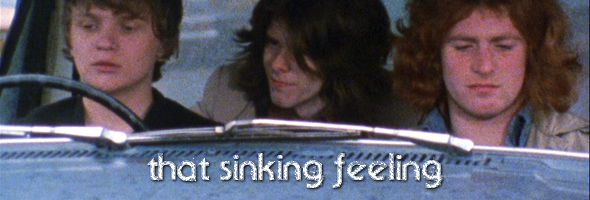
Color, 1979, 93m.
Directed by Bill Forsyth
Starring Robert Buchanan, Drew Burns, John Hughes, Billy Greenlees, John Gordon Sinclair, Allan Love
BFI (Blu-ray & DVD) (UK R0 HD/PAL), 2Entertain (UK R2 PAL)
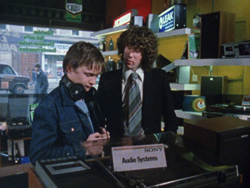 If you had to pick one filmmaker to represent Scottish cinema, chances are the top choice would be Bill Forsyth,
If you had to pick one filmmaker to represent Scottish cinema, chances are the top choice would be Bill Forsyth, 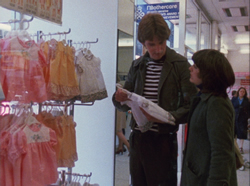 who put local cinema on the map with acclaimed films like Gregory's Girl, the brilliant Local Hero, and Comfort and Joy. He sadly decided to throw in the directorial towel after the hostile reception to Being Human and a little-seen sequel, Gregory's Two Girls, but his status as a major talent remains intact. However, Forsyth actually got his start with That Sinking Feeling, a hilarious little gem featuring talent recruited from members of the Glasgow Youth Theatre. At the time it was also a Guinness record holder for the cheapest theatrical release of all time adjusted for inflation, a pretty amazing feat given the final result.
who put local cinema on the map with acclaimed films like Gregory's Girl, the brilliant Local Hero, and Comfort and Joy. He sadly decided to throw in the directorial towel after the hostile reception to Being Human and a little-seen sequel, Gregory's Two Girls, but his status as a major talent remains intact. However, Forsyth actually got his start with That Sinking Feeling, a hilarious little gem featuring talent recruited from members of the Glasgow Youth Theatre. At the time it was also a Guinness record holder for the cheapest theatrical release of all time adjusted for inflation, a pretty amazing feat given the final result.
While wandering the streets one afternoon, aimless, unemployed Ronnie (Buchanan) gets a brainstorm while passing a bathroom supply store: to steal a shipment of 93 stainless steel sinks and make a killing by reselling them. He pitches the idea to his four friends -- Wal (Greenlees), Vic (Hughes), Pete (Burns), and Andy (future Gregory's Girl star Sinclair) -- who embellish it by suggesting the use of decoys, such as having two of them dress up in drag as cleaning women to knock out the night watchman. Even those who have meager jobs want something better, so it seems like a possible ticket to get the cash and move on the right track. The heist itself proves to be a comedy of confusion and mishaps involving misjudged hand signals and a borderline sci-fi chemical concoction, but a lot of the joy along the way involves the interplay of the lads and distractions like swans, bees, geography lessons, and the perfect overseas vacation spot.
Essentially unseen outside the United Kingdom upon its original release, That Sinking Feeling got a major boost after the success of Gregory's Girl and was picked up for American distribution in 1981 by the Samuel Goldwyn Company, who commissioned a new dub featuring more generic Scottish accents, the removal of all local references, and a new, drastically muffled 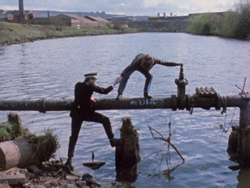 sound effects track. That version popped up on American cable TV and a VHS release from Embassy, which lingered on video shelves for many years. Meanwhile the original Glaswegian audio was used for the UK VHS version up into the early '90s, but...
sound effects track. That version popped up on American cable TV and a VHS release from Embassy, which lingered on video shelves for many years. Meanwhile the original Glaswegian audio was used for the UK VHS version up into the early '90s, but...
A furor erupted among the film's fans in 2009 when That Sinking Feeling finally merited a DVD release, the first ever in the world, courtesy of UK label 2 Entertain. Unfortunately their much-publicized restoration used the international dubbed track, pretty much infuriating every potential customer and famously plunging its Amazon rating down to one star. A US release never materialized at all, but luckily that first UK disc  is easily eclipsed by the 2014 version from the BFI, a dual-format Blu-ray and DVD in their exceptional Flipside line. This may be the most genteel and prestigious title in the series to date, but the colorful Scottish milieu and oddball humor still make it fit like a glove. As for the transfer, well, we are talking about a very cheap 16mm production loaded with grain, and that's exactly what you get here. (Thankfully, no excessive noise reduction seems to have been applied to make it look more "modern.") It's easily a huge upgrade over the previous video options, which were generally a smudgy and sad-looking bunch. The original aspect ratio is also retained here, looking far more comfortable than most theatrical prints which cropped it down as tight as 1.85:1. The LPCM audio is also faithful to the original source of the Glaswegian audio, which is pretty raw and scratchy at times; the pretty horrific alternate redubbed track is also included for the sake of completeness, but it's often distractingly out of synch and strips out lots of the original sound mix and general ambience, too. Optional English subtitles are included, too, in case the accents prove too thick for some viewers.
is easily eclipsed by the 2014 version from the BFI, a dual-format Blu-ray and DVD in their exceptional Flipside line. This may be the most genteel and prestigious title in the series to date, but the colorful Scottish milieu and oddball humor still make it fit like a glove. As for the transfer, well, we are talking about a very cheap 16mm production loaded with grain, and that's exactly what you get here. (Thankfully, no excessive noise reduction seems to have been applied to make it look more "modern.") It's easily a huge upgrade over the previous video options, which were generally a smudgy and sad-looking bunch. The original aspect ratio is also retained here, looking far more comfortable than most theatrical prints which cropped it down as tight as 1.85:1. The LPCM audio is also faithful to the original source of the Glaswegian audio, which is pretty raw and scratchy at times; the pretty horrific alternate redubbed track is also included for the sake of completeness, but it's often distractingly out of synch and strips out lots of the original sound mix and general ambience, too. Optional English subtitles are included, too, in case the accents prove too thick for some viewers.
Another very welcome audio option is a new audio commentary with Forsyth and admirer Mark Kermode, and it's a very rewarding conversation indeed. Early on Forsyth reiterates his preference for this "down and dirty" comedy over Gregory's Girl ("a piece of fluff"), and he's full of stories about jumping to this from early documentary work, rounding up food for the crew, and crafting an accomplished film on the smallest means imaginable. 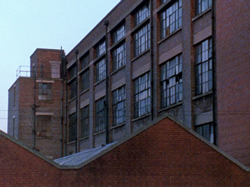 Kermode also points out some nice nods to the heritage of comedy films found here, ranging from classic silent comedians to the oft-remarked Ealing influence. They also cover the theater, TV and film careers of the cast members, several of whom will be familiar now to movie buffs.
Kermode also points out some nice nods to the heritage of comedy films found here, ranging from classic silent comedians to the oft-remarked Ealing influence. They also cover the theater, TV and film careers of the cast members, several of whom will be familiar now to movie buffs.
Next we move on to the substantial video extras, which clock in at over two hours in total. A new 14-minute interview with Buchanan (whose distinctive voice is still almost exactly the same) covers the film's initial casting and production (including attempts to get funding from the BFI) and the balance between scripting and improvisation on the project, not to mention the problems filming with a perforated eardrum. A pretty astonishing nine-minute video with Kermode and Forsyth prior to a screening of the film walks through some of the original money-raising and budgetary documents to show just how close to the bone he had to work with a whopping £5,000 for the production. An amusing 2009 BAFTA acceptance 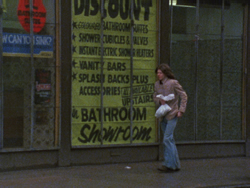 video by Forsyth features him strolling through his neighborhood offering a droll account of how he got into the Scottish film business during its "prehistoric beginnings." Then it's a leap back in time with four vintage shorts starting with 1969's "KH-4," a 12-minute John Schorstein film with a very young, shaggy-haired Forsyth as a painter hauling a canvas through Glasgow slums being bulldozed and torched to make way for new developments. The Loach-inspired, black-and-white short is stark and spare, eschewing dialogue in favor of a visual essay about a city in transition (and not necessarily for the better). Schorstein's "Mirror" (1970) is even less concrete, with Forsyth returning as a writer combing the city after his girlfriend leaves in the morning with nary a word of explanation. It's absurdly overlong at 33 minutes and technically very sloppy in spots, but the urban setting and jazzy soundtrack create an intriguing snapshot of a city in cultural flux. 1971's "Glasgow 1980" drops any narrative pretense as director Oscar Marzaroli captures a half-hour portrait of the city "changing for the people," with coverage of the construction of the Kingston Bridge and optimistic cheerleading of the new housing developments bouncing against footage of the people at work and play. Forsyth actually edited this one, including some effective montages and humorous musical counterpoint. The score by forgotten jazz musician Iain McHaffie is another highlight, especially the catchy main theme. An example of Forsyth's early documentary directing can finally be found in another half-hour film, 1972's "Islands of the West," a dreamy, beautifully shot look at life in the Outer Hebrides. Interestingly, this actually plays like a trial run for some of the aesthetic ideas he would later explore in Local Hero, so fans of that one should find this extra of particular interest. As usual, the liner notes booklet is substantial and highly recommended courtesy of written contributions from David Archibald, Colin Tully, Douglas Weir, Martin Tierney, and a charming piece by Forsyth for a 1981 symposium on British cinema ("If I had a daughter she wouldn't be allowed to date someone who didn't like Pierrot le Fou.") A fine package for a great little film, finally presented for the first time ever in an edition that does it justice.
video by Forsyth features him strolling through his neighborhood offering a droll account of how he got into the Scottish film business during its "prehistoric beginnings." Then it's a leap back in time with four vintage shorts starting with 1969's "KH-4," a 12-minute John Schorstein film with a very young, shaggy-haired Forsyth as a painter hauling a canvas through Glasgow slums being bulldozed and torched to make way for new developments. The Loach-inspired, black-and-white short is stark and spare, eschewing dialogue in favor of a visual essay about a city in transition (and not necessarily for the better). Schorstein's "Mirror" (1970) is even less concrete, with Forsyth returning as a writer combing the city after his girlfriend leaves in the morning with nary a word of explanation. It's absurdly overlong at 33 minutes and technically very sloppy in spots, but the urban setting and jazzy soundtrack create an intriguing snapshot of a city in cultural flux. 1971's "Glasgow 1980" drops any narrative pretense as director Oscar Marzaroli captures a half-hour portrait of the city "changing for the people," with coverage of the construction of the Kingston Bridge and optimistic cheerleading of the new housing developments bouncing against footage of the people at work and play. Forsyth actually edited this one, including some effective montages and humorous musical counterpoint. The score by forgotten jazz musician Iain McHaffie is another highlight, especially the catchy main theme. An example of Forsyth's early documentary directing can finally be found in another half-hour film, 1972's "Islands of the West," a dreamy, beautifully shot look at life in the Outer Hebrides. Interestingly, this actually plays like a trial run for some of the aesthetic ideas he would later explore in Local Hero, so fans of that one should find this extra of particular interest. As usual, the liner notes booklet is substantial and highly recommended courtesy of written contributions from David Archibald, Colin Tully, Douglas Weir, Martin Tierney, and a charming piece by Forsyth for a 1981 symposium on British cinema ("If I had a daughter she wouldn't be allowed to date someone who didn't like Pierrot le Fou.") A fine package for a great little film, finally presented for the first time ever in an edition that does it justice.
Reviewed on April 8, 2014.


 If you had to pick one filmmaker to represent Scottish cinema, chances are the top choice would be Bill Forsyth,
If you had to pick one filmmaker to represent Scottish cinema, chances are the top choice would be Bill Forsyth,  who put local cinema on the map with acclaimed films like Gregory's Girl, the brilliant Local Hero, and Comfort and Joy. He sadly decided to throw in the directorial towel after the hostile reception to Being Human and a little-seen sequel, Gregory's Two Girls, but his status as a major talent remains intact. However, Forsyth actually got his start with That Sinking Feeling, a hilarious little gem featuring talent recruited from members of the Glasgow Youth Theatre. At the time it was also a Guinness record holder for the cheapest theatrical release of all time adjusted for inflation, a pretty amazing feat given the final result.
who put local cinema on the map with acclaimed films like Gregory's Girl, the brilliant Local Hero, and Comfort and Joy. He sadly decided to throw in the directorial towel after the hostile reception to Being Human and a little-seen sequel, Gregory's Two Girls, but his status as a major talent remains intact. However, Forsyth actually got his start with That Sinking Feeling, a hilarious little gem featuring talent recruited from members of the Glasgow Youth Theatre. At the time it was also a Guinness record holder for the cheapest theatrical release of all time adjusted for inflation, a pretty amazing feat given the final result. sound effects track. That version popped up on American cable TV and a VHS release from Embassy, which lingered on video shelves for many years. Meanwhile the original Glaswegian audio was used for the UK VHS version up into the early '90s, but...
sound effects track. That version popped up on American cable TV and a VHS release from Embassy, which lingered on video shelves for many years. Meanwhile the original Glaswegian audio was used for the UK VHS version up into the early '90s, but... is easily eclipsed by the 2014 version from the BFI, a dual-format Blu-ray and DVD in their exceptional Flipside line. This may be the most genteel and prestigious title in the series to date, but the colorful Scottish milieu and oddball humor still make it fit like a glove. As for the transfer, well, we are talking about a very cheap 16mm production loaded with grain, and that's exactly what you get here. (Thankfully, no excessive noise reduction seems to have been applied to make it look more "modern.") It's easily a huge upgrade over the previous video options, which were generally a smudgy and sad-looking bunch. The original aspect ratio is also retained here, looking far more comfortable than most theatrical prints which cropped it down as tight as 1.85:1. The LPCM audio is also faithful to the original source of the Glaswegian audio, which is pretty raw and scratchy at times; the pretty horrific alternate redubbed track is also included for the sake of completeness, but it's often distractingly out of synch and strips out lots of the original sound mix and general ambience, too. Optional English subtitles are included, too, in case the accents prove too thick for some viewers.
is easily eclipsed by the 2014 version from the BFI, a dual-format Blu-ray and DVD in their exceptional Flipside line. This may be the most genteel and prestigious title in the series to date, but the colorful Scottish milieu and oddball humor still make it fit like a glove. As for the transfer, well, we are talking about a very cheap 16mm production loaded with grain, and that's exactly what you get here. (Thankfully, no excessive noise reduction seems to have been applied to make it look more "modern.") It's easily a huge upgrade over the previous video options, which were generally a smudgy and sad-looking bunch. The original aspect ratio is also retained here, looking far more comfortable than most theatrical prints which cropped it down as tight as 1.85:1. The LPCM audio is also faithful to the original source of the Glaswegian audio, which is pretty raw and scratchy at times; the pretty horrific alternate redubbed track is also included for the sake of completeness, but it's often distractingly out of synch and strips out lots of the original sound mix and general ambience, too. Optional English subtitles are included, too, in case the accents prove too thick for some viewers.  Kermode also points out some nice nods to the heritage of comedy films found here, ranging from classic silent comedians to the oft-remarked Ealing influence. They also cover the theater, TV and film careers of the cast members, several of whom will be familiar now to movie buffs.
Kermode also points out some nice nods to the heritage of comedy films found here, ranging from classic silent comedians to the oft-remarked Ealing influence. They also cover the theater, TV and film careers of the cast members, several of whom will be familiar now to movie buffs.  video by Forsyth features him strolling through his neighborhood offering a droll account of how he got into the Scottish film business during its "prehistoric beginnings." Then it's a leap back in time with four vintage shorts starting with 1969's "KH-4," a 12-minute John Schorstein film with a very young, shaggy-haired Forsyth as a painter hauling a canvas through Glasgow slums being bulldozed and torched to make way for new developments. The Loach-inspired, black-and-white short is stark and spare, eschewing dialogue in favor of a visual essay about a city in transition (and not necessarily for the better). Schorstein's "Mirror" (1970) is even less concrete, with Forsyth returning as a writer combing the city after his girlfriend leaves in the morning with nary a word of explanation. It's absurdly overlong at 33 minutes and technically very sloppy in spots, but the urban setting and jazzy soundtrack create an intriguing snapshot of a city in cultural flux. 1971's "Glasgow 1980" drops any narrative pretense as director Oscar Marzaroli captures a half-hour portrait of the city "changing for the people," with coverage of the construction of the Kingston Bridge and optimistic cheerleading of the new housing developments bouncing against footage of the people at work and play. Forsyth actually edited this one, including some effective montages and humorous musical counterpoint. The score by forgotten jazz musician Iain McHaffie is another highlight, especially the catchy main theme. An example of Forsyth's early documentary directing can finally be found in another half-hour film, 1972's "Islands of the West," a dreamy, beautifully shot look at life in the Outer Hebrides. Interestingly, this actually plays like a trial run for some of the aesthetic ideas he would later explore in Local Hero, so fans of that one should find this extra of particular interest. As usual, the liner notes booklet is substantial and highly recommended courtesy of written contributions from David Archibald, Colin Tully, Douglas Weir, Martin Tierney, and a charming piece by Forsyth for a 1981 symposium on British cinema ("If I had a daughter she wouldn't be allowed to date someone who didn't like Pierrot le Fou.") A fine package for a great little film, finally presented for the first time ever in an edition that does it justice.
video by Forsyth features him strolling through his neighborhood offering a droll account of how he got into the Scottish film business during its "prehistoric beginnings." Then it's a leap back in time with four vintage shorts starting with 1969's "KH-4," a 12-minute John Schorstein film with a very young, shaggy-haired Forsyth as a painter hauling a canvas through Glasgow slums being bulldozed and torched to make way for new developments. The Loach-inspired, black-and-white short is stark and spare, eschewing dialogue in favor of a visual essay about a city in transition (and not necessarily for the better). Schorstein's "Mirror" (1970) is even less concrete, with Forsyth returning as a writer combing the city after his girlfriend leaves in the morning with nary a word of explanation. It's absurdly overlong at 33 minutes and technically very sloppy in spots, but the urban setting and jazzy soundtrack create an intriguing snapshot of a city in cultural flux. 1971's "Glasgow 1980" drops any narrative pretense as director Oscar Marzaroli captures a half-hour portrait of the city "changing for the people," with coverage of the construction of the Kingston Bridge and optimistic cheerleading of the new housing developments bouncing against footage of the people at work and play. Forsyth actually edited this one, including some effective montages and humorous musical counterpoint. The score by forgotten jazz musician Iain McHaffie is another highlight, especially the catchy main theme. An example of Forsyth's early documentary directing can finally be found in another half-hour film, 1972's "Islands of the West," a dreamy, beautifully shot look at life in the Outer Hebrides. Interestingly, this actually plays like a trial run for some of the aesthetic ideas he would later explore in Local Hero, so fans of that one should find this extra of particular interest. As usual, the liner notes booklet is substantial and highly recommended courtesy of written contributions from David Archibald, Colin Tully, Douglas Weir, Martin Tierney, and a charming piece by Forsyth for a 1981 symposium on British cinema ("If I had a daughter she wouldn't be allowed to date someone who didn't like Pierrot le Fou.") A fine package for a great little film, finally presented for the first time ever in an edition that does it justice.